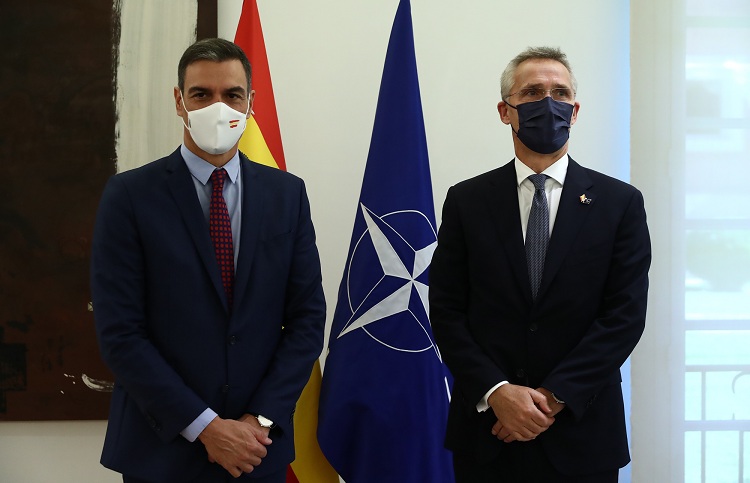The Diplomat
The President of the Government, Pedro Sánchez, will visit today the Spanish troops assigned to the NATO mission in Latvia, where he will coincide with the Secretary General of the Atlantic Alliance, Jens Stoltenberg.
The aim of Sánchez’s visit to Latvia is to express “the transatlantic commitment and unity in the current crisis with Russia and the support of all the allies to the Baltic countries”, according to sources from Moncloa to the Europa Press agency.
According to NATO’s agenda, Jens Stoltenberg will arrive today in Latvia, where he will be received in Riga by the country’s president, Egils Levits. He will then travel to the Adazi military base, where he will visit the troops of the Alliance mission together with Pedro Sanchez, the Prime Minister of Latvia, Krisjanis Kariņs; and the Prime Minister of Canada, Justin Trudeau. At the end of the meeting, the four leaders will hold a joint press conference.
The Spanish Armed Forces have had 350 troops at the Adazi base since 2017, as part of the NATO Battle Group involved in the Enhanced Forward Presence (eFP) mission. The contingent will be complemented by the 150 military personnel announced last March 1 by the Ministry of Defense in compliance with the Alliance’s decision to reinforce the eastern flank following the Russian invasion of Ukraine. The first troops left on Thursday for Latvia. This operational adjustment is covered by the agreements of the Council of Ministers on peace missions abroad and will not require the authorization of the Congress of Deputies because it is part of a deployment already authorized by the Parliament.
The eFP mission aims to maintain deterrence against any aggression against the Baltic allies, through a defensive deployment, and responds to the existing commitment within the Alliance to assist the allied countries. Canada – whose prime minister is touring several European countries to address the Russian invasion of Ukraine – is currently leading the mission, while Spain is the second contributor.
Margarita Robles, Podemos and the arms shipment
On the other hand, the Minister of Defense, Margarita Robles, will appear tomorrow in the Defense Committee of the Congress to report on the Government’s decisions regarding the Russian invasion of Ukraine, including the direct shipment of weapons to that country.
Robles will appear at her own request. However, at the request of the Popular group, she will explain the actions of the Executive in the framework of the European Union and NATO regarding Ukraine and “the eventual sending of troops”. Likewise, the Plural, Republican and Euskal Herria Bildu groups have also asked the head of Defense to explain the reasons that “lead the Government to promote the direct involvement of the Spanish State in the serious crisis produced between Russia and Ukraine and NATO”.
Although it is not on the agenda, it is foreseeable that the Minister will report on the recent decision of the Government to send offensive material of the Army to Ukraine, specifically 1,370 grenade launchers against tanks, 700,000 cartridges for machine guns and rifles and light machine guns.
This issue has threatened to open important fissures in the coalition government of Pedro Sánchez, especially after the Minister of Social Rights and leader of Podemos, Ione Belarra, described the PSOE as a “party of war”. In this regard, Margarita Robles herself was surprised yesterday – in statements to La Sexta – because “some political group, with a small vision of the international context and so unsympathetic to the citizens of Ukraine, is in internal positions so far from the international position”. “The warlord and the one who makes war is Putin. Whoever does not want to see it that way is perhaps not very aware of the massacres he is carrying out,” she added.
“The position of the Government of Spain, we have said it many times, moreover it is what the law establishes, it is marked by the President of the Government and the President of the Government is clear and forceful in this matter, in that message of unity,” she also declared to Onda Cero. “That is the real message. Then there will be individual opinions, particular opinions,” she added.
For her part, Podemos spokeswoman Isa Serra denied yesterday at a press conference that Belarra was referring to the PSOE when she spoke this Sunday of “war parties” and assured that these words were aimed at the “warmongering fervor” of the right. “Sánchez knows that he has our support even if we think different things,” Serra said.






